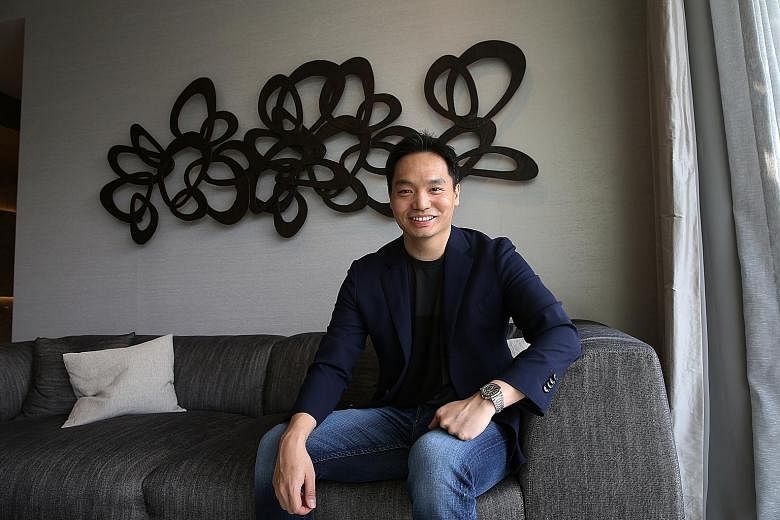Q How was Habitap born?
A I started working at Philip Tang and Sons, a developer of customised systems and software for local private sector companies. We designed and built software that is customised according to clients' needs.
In 2011, we shifted towards developing our own brands for various types of software. We partnered a global tech giant in 2015 to build a prototype of a smart home in Singapore. The prototype, in line with Singapore's Smart Nation drive, registered strong interest from local private property developers.
We realised that while there were many smart home products globally, they were poorly integrated or not integrated. Most products required specially created applications for each of their functions. This resulted in the creation of multiple apps, making it troublesome for homeowners to execute actions.
We believed having an integrated solution that connects all these apps would bring convenience to homeowners. With this gap to be filled, I launched Habitap in July last year with Corals at Keppel Bay.
Q What technology solutions does Habitap provide?
A Habitap is an app that consolidates control functions from three key pillars - smart home control, smart community management and lifestyle offerings - to provide holistic luxury home living.
Owners can control their homes from anywhere using the app, like changing the air-conditioning temperature or drawing the curtains.
Habitap uses Alexa, a home automation device by Amazon, to allow homeowners to control smart appliances at home via voice commands.
We collaborate with firms like electrical appliance companies in developing suitable hardware in sync with our app. For instance, we partner air-con manufacturer Daikin to integrate the functions of its remote control in our app.
Homeowners can also manage community facilities within their residence via our app, such as booking facilities. The app doubles as an intercom to replace access cards when homeowners invite guests.
In addition, users can curate their lifestyles with the app's smart lifestyle directory, which offers services like groceries and dining.
We have also adapted Habitap for commercial buildings, mixed developments and smart office purposes.
Q What were some challenges that Habitap faced?
A Our biggest challenge was the marrying of technology with the hardware-focused property sector. Most appliance companies view appliances such as the oven as hardware, not software. They do not consider integrating the functions of different appliances into a single software.
The process of integrating many existing apps was tough. However, we managed to work effectively with all stakeholders.
We focus on integrating hardware products via our app, where the hardware supports the app experience, rather than apps acting as add-on features.
People may be reluctant to spend on smart home technology and see it as unnecessary. I believe that mindsets take time to change.
Previously, fewer people understood the benefits of having smart homes, but mindsets are slowly changing. With more people desiring convenience and comfort, like turning on the air-con before reaching home on a hot day, the usage rate of our app is higher.
When we launched Habitap, we were lucky to have Singapore's high smartphone penetration and consumers' ease with using apps. Not needing to "learn" using the Habitap app meant the learning curve for smart technology usage is not as steep.
Q How well is Singapore coping with smart technology solutions?
A There is growing smart home and office technology usage in Singapore, compared with 11/2 years ago. Most new private residential projects feature basic smart features and technology. Homeowners are also savvier with smart homes.
Nonetheless, the focus is on new private property developments. Existing properties and Housing Board flats are relatively untapped. They represent huge opportunities.
With Singapore's Smart Nation initiative, there are many growth areas in smart technology for Habitap.
The Government is pushing technological advancement in the right direction. Much of our success is due to this government objective and its halo effect.
Most people would have at least heard of the Smart Nation drive and smart technology, as well as have an idea of how it improves their lives.
Q How is Habitap coping with strong demand for its solutions?
A We have 25 employees of various designations. We will have over 3,000 residential users by the third quarter of this year.
We are developing our own home automation system and voice command system where one could hold "conversations" with one's home.
In addition, we are introducing Habitap to community aspects like carparks, lifts and security systems.
We are creating new service models, such as refined concierge services. Users may buy groceries online for the concierge to collect and deposit in their home storage.
We are also tapping student accommodation in Australia and the United States. We could leverage students' tech-savviness to integrate Habitap in student hostel services.
We could offer added productivity to firms and commercial developments too. In this year's third quarter, we will work on a local smart serviced office project and the two largest mixed-development projects in Singapore. These would showcase the concept of an app for both the home and office. We will also start on a retrofit commercial project by the end of this year.
We will launch two commercial projects, in Myanmar and Vietnam, within the third quarter of this year.
We are also conducting feasibility studies for other areas of the property industry like refurbishment plans for current buildings and even entire townships.

